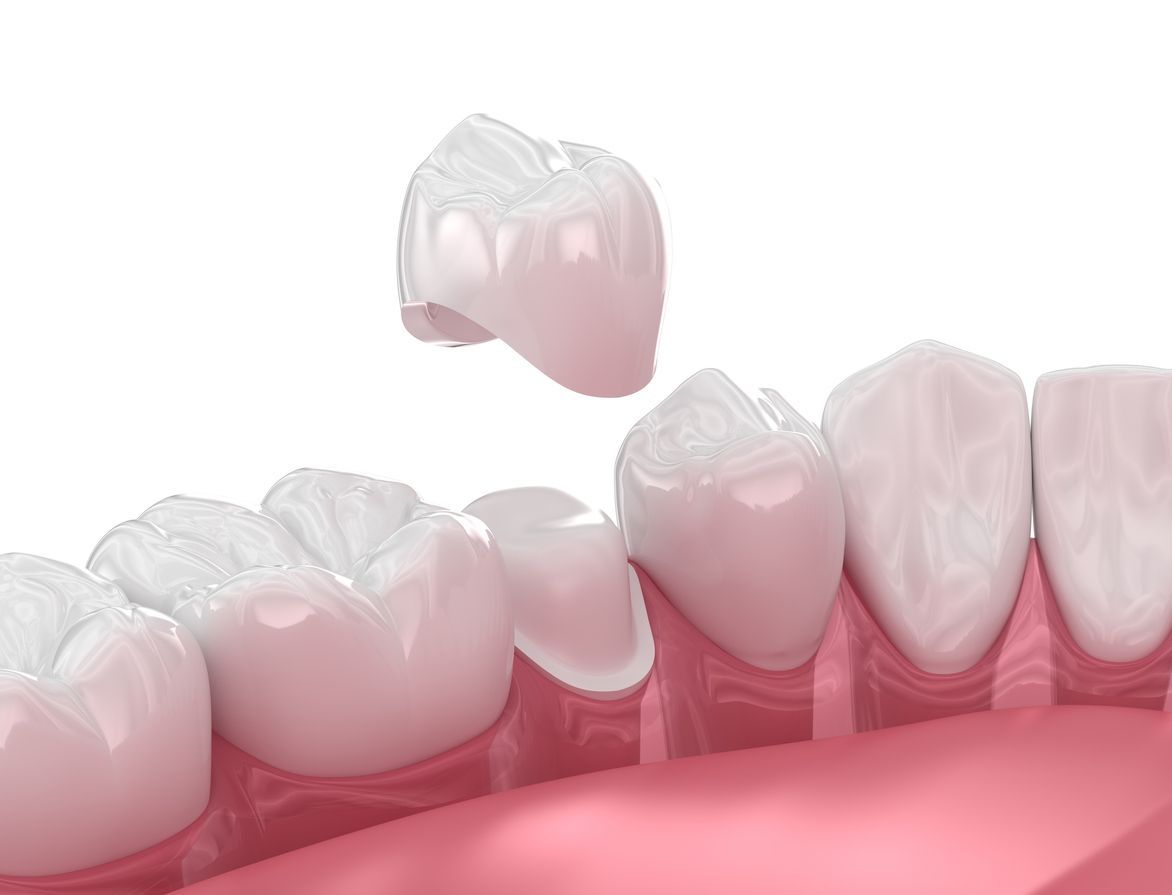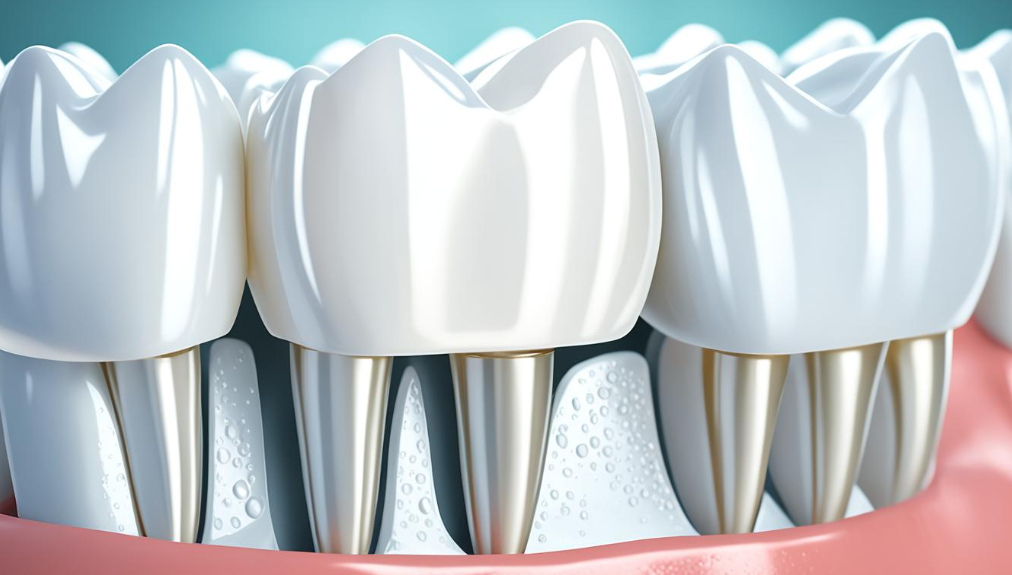Dental Crowns: Your Guide to a Brilliant Smile

Dental Crowns: Your Guide to a Brilliant Smile
Welcome to our comprehensive guide on dental crowns. If you're looking to improve the appearance of your smile and restore function to your teeth, dental crowns could be the solution you've been searching for. In this guide, we will explore the benefits of dental crowns and provide you with all the information you need to know before getting them.
Whether you have chipped, cracked, or severely discolored teeth, dental crowns can help transform your smile and boost your confidence. They are custom-made prosthetic caps that are placed over damaged teeth to restore their shape, size, and strength. With dental crowns, you can achieve a brilliant smile that you'll be proud to show off.
Not only do dental crowns provide cosmetic benefits, but they also offer functional advantages. They can strengthen weak teeth, protect them from further damage, and improve your bite. If you have dental issues such as tooth decay, broken fillings, or a large filling, dental crowns can be an excellent option for restoring your oral health.
In the following sections, we will delve deeper into the world of dental crowns, covering everything from their purpose and benefits to the materials used and the process of getting them. By the end of this guide, you will have a comprehensive understanding of dental crowns and be equipped to make informed decisions about your dental health.
Key Takeaways:
- Dental crowns are custom-made caps that can restore the appearance and function of damaged teeth.
- Dental crowns can strengthen weak teeth and protect them from further damage.
- They offer both cosmetic and functional benefits, improving the look of your smile and bite.
- Dental crowns are suitable for various dental issues, such as tooth decay or broken fillings.
- By the end of this guide, you'll be equipped to make informed decisions about dental crowns and their benefits.
Understanding Dental Crowns and Their Benefits
Dental crowns are a versatile and effective treatment option for restoring damaged or unsightly teeth. They can not only enhance the appearance of your smile but also improve the functionality of your teeth. In this section, we will provide you with a comprehensive understanding of dental crowns, including their purpose, advantages, and the materials used in their fabrication.
What are Dental Crowns?
A dental crown, also known as a dental cap, is a custom-made restoration that covers a damaged or decayed tooth. It is designed to encase the entire visible portion of the tooth, providing strength, protection, and an aesthetically pleasing appearance.
Dental crowns serve various purposes, including:
- Restoring severely decayed or damaged teeth
- Providing structural support to a tooth after root canal treatment
- Strengthening a tooth with a large filling
- Improving the appearance of misshapen or discolored teeth
With dental crowns, you can achieve a natural-looking smile while ensuring the longevity and functionality of your teeth.
The Advantages of Choosing Dental Crowns
When considering dental restorations, there are several advantages to choosing dental crowns over other options:
- Durability: Dental crowns are made from strong materials such as porcelain, ceramic, or metal alloys, which provide excellent durability and long-lasting results.
- Natural Appearance: The customized design and color of dental crowns help them blend seamlessly with the surrounding teeth, creating a natural-looking smile.
- Improved Functionality: Dental crowns restore the shape, size, and strength of damaged teeth, allowing for improved biting and chewing abilities.
- Protection: By covering and protecting a weakened tooth, dental crowns help prevent further damage and decay.
- Versatility: Dental crowns can be used to address various dental issues, making them a versatile solution for many patients.
Materials Used in Dental Crowns: Pros and Cons
Dental crowns can be fabricated from different materials, each with its own set of advantages and considerations.
The most common types of dental crown materials include:
- Porcelain: Porcelain crowns are known for their natural appearance and ability to mimic the translucency of natural teeth. They are a popular choice for front teeth restorations. However, they may be prone to chipping or cracking, making them less ideal for teeth with heavy biting forces.
- Metal: Metal crowns, typically made from gold or silver alloy, offer excellent durability and strength. Although they are highly functional, their metallic appearance may make them less desirable for visible teeth.
- Porcelain-fused-to-metal (PFM): PFM crowns combine the strength of metal with the aesthetic appeal of porcelain. They provide a good balance of durability and natural appearance. However, over time, the porcelain portion of the crown may wear down, revealing the underlying metal. This can result in a less natural appearance.
- Zirconia: Zirconia crowns are known for their exceptional strength, durability, and natural appearance. They are a popular choice for both front and back teeth restorations. However, they can be more expensive compared to other materials.
When choosing a dental crown material, it's essential to consider factors such as aesthetics, durability, and the specific needs of your teeth. Your dentist can guide you in selecting the most suitable material for your dental crown, ensuring optimal results.
The Process of Getting Dental Crowns
In this section, we will walk you through the process of getting dental crowns. From the initial consultation to the final placement of the crowns, we will explain each step involved in the dental crown procedure. Whether you're getting dental crowns for cosmetic purposes or to restore the functionality of your teeth, understanding the dental crown process is essential.
1. Initial Consultation: The first step in getting dental crowns is to schedule an appointment with your dentist. During the initial consultation, your dentist will examine your teeth and determine if dental crowns are the right solution for you. They will discuss the benefits, risks, and alternative options.
2. Tooth Preparation: Once you decide to proceed with dental crowns, your dentist will prepare the affected teeth. This involves removing a small portion of the tooth's outer layer to create space for the crown. In some cases, if the tooth is severely damaged or decayed, additional treatment, such as root canal therapy, may be required.
3. Impressions: After tooth preparation, your dentist will take impressions of your teeth. These impressions will serve as a blueprint for creating custom-made dental crowns that fit perfectly over your natural teeth. The impressions are sent to a dental laboratory, where highly skilled technicians will fabricate your crowns.
4. Temporary Crowns: While your permanent crowns are being made, your dentist will place temporary crowns on your prepared teeth. These temporary crowns protect the tooth structure and provide aesthetics while you wait for the final crowns.
5. Final Crown Placement: Once your permanent crowns are ready, you will return to the dental office for the final placement. Your dentist will remove the temporary crowns and ensure the fit, color, and shape of the permanent crowns meet your expectations. They will then bond the crowns to your natural teeth using dental cement.
It's important to note that the dental crown process may vary slightly depending on individual cases. Your dentist will guide you through each step and address any concerns or questions you may have along the way. By the end of the process, you will have beautifully restored teeth and a confident smile.

Maintaining Your Dental Crowns for Longevity
Once you have dental crowns, it's important to take care of them to ensure their longevity. Proper maintenance and oral hygiene are key to keeping your dental crowns in great condition. Here are some everyday care tips to help you maintain your dental crowns:
Everyday Care Tips
- Brush your teeth at least twice a day with a soft-bristled toothbrush. Be gentle around your dental crowns to avoid damaging them.
- Use a non-abrasive toothpaste to prevent scratching the surface of your crowns.
- Floss daily to remove plaque and food particles from between your teeth and around your dental crowns.
- Consider using an antimicrobial mouthwash to further reduce the risk of gum disease and maintain oral hygiene.
- Avoid
chewing on hard foods
or
non-food items, such as ice or pens, as these can cause damage to your dental crowns.
In addition to proper care at home, regular dental check-ups are vital to ensuring the longevity of your dental crowns. These check-ups allow your dentist to monitor the condition of your crowns and address any issues before they worsen.
Regular Dental Check-Up Importance
During your dental check-ups, your dentist will examine your dental crowns and assess their fit and function. They will also clean your teeth thoroughly, removing any plaque or tartar buildup that can affect the health of your crowns. Regular check-ups help to address any issues with your crowns early on, allowing for timely interventions and preventing more severe problems.
Addressing Issues with Your Crowns Early On
If you experience any discomfort, sensitivity, or notice changes in the appearance or function of your dental crowns, it's crucial to seek professional dental care promptly.
Early intervention can help prevent further damage and preserve the integrity of your crowns. Schedule an appointment with your dentist if you encounter any of the following issues:
- Loose or wobbly crowns
- Chips or cracks in the crowns
- Inflammation or gum sensitivity around the crowns
- Discoloration or staining on the crowns
- Difficulty with biting or chewing
By following these everyday care tips, attending regular dental check-ups, and addressing issues with your crowns early on, you can maintain the longevity and function of your dental crowns, ensuring a healthy and beautiful smile for years to come.
Conclusion
In conclusion, dental crowns are a versatile and effective solution for restoring damaged or unsightly teeth. Throughout this comprehensive guide, we have explored the benefits of dental crowns and provided you with valuable information to help you make informed decisions about your dental health.
By choosing dental crowns, you can enjoy a brilliant smile and improved tooth functionality. Whether you need to repair a cracked tooth, strengthen a weakened tooth, or enhance the appearance of your smile, dental crowns offer a reliable and long-lasting solution.
We encourage you to consult with
Dr Rauchwerger
and his staff to determine if dental crowns are the right option for you. Your dentist will be able to evaluate your specific dental needs and provide personalized recommendations. Remember, maintaining good oral hygiene and scheduling regular dental check-ups are essential to ensuring the longevity of your dental crowns.
With the knowledge gained from this guide, you are now equipped to make informed decisions about your dental health. Take the first step towards a brilliant smile by exploring the benefits of dental crowns today.
FAQ
What are dental crowns?
Dental crowns are dental restorations that cover and protect a damaged or weakened tooth. They are often made from materials like porcelain or ceramic and are designed to look and function like natural teeth.
What are the advantages of choosing dental crowns?
Dental crowns offer several benefits, including improving the appearance of your smile, protecting weak or decayed teeth from further damage, restoring the function of broken or chipped teeth, and supporting dental bridges or dental implants.
What materials are used in dental crowns, and what are their pros and cons?
Dental crowns can be made from various materials, such as porcelain, ceramic, metal alloys, or a combination of these. Porcelain and ceramic crowns provide a natural-looking appearance and are suitable for front teeth, while metal crowns are more durable and often used for molars. The choice of material depends on factors like aesthetic preferences, the location of the tooth, and the individual's oral health needs.
What is the process of getting dental crowns?
The process of getting dental crowns typically involves multiple visits to the dentist. It starts with an initial consultation, where your dentist will examine your teeth and determine if crowns are the right option for you. The next steps include tooth preparation, taking dental impressions, and placing temporary crowns. Finally, your permanent crowns are fabricated, and your dentist will cement them onto your teeth.
How do I maintain my dental crowns for longevity?
To maintain the longevity of your dental crowns, it is important to practice good oral hygiene by brushing and flossing regularly. Avoid biting or chewing on hard objects or foods that can damage the crowns. Attend regular dental check-ups and promptly address any issues or discomfort with your crowns to prevent further complications.
